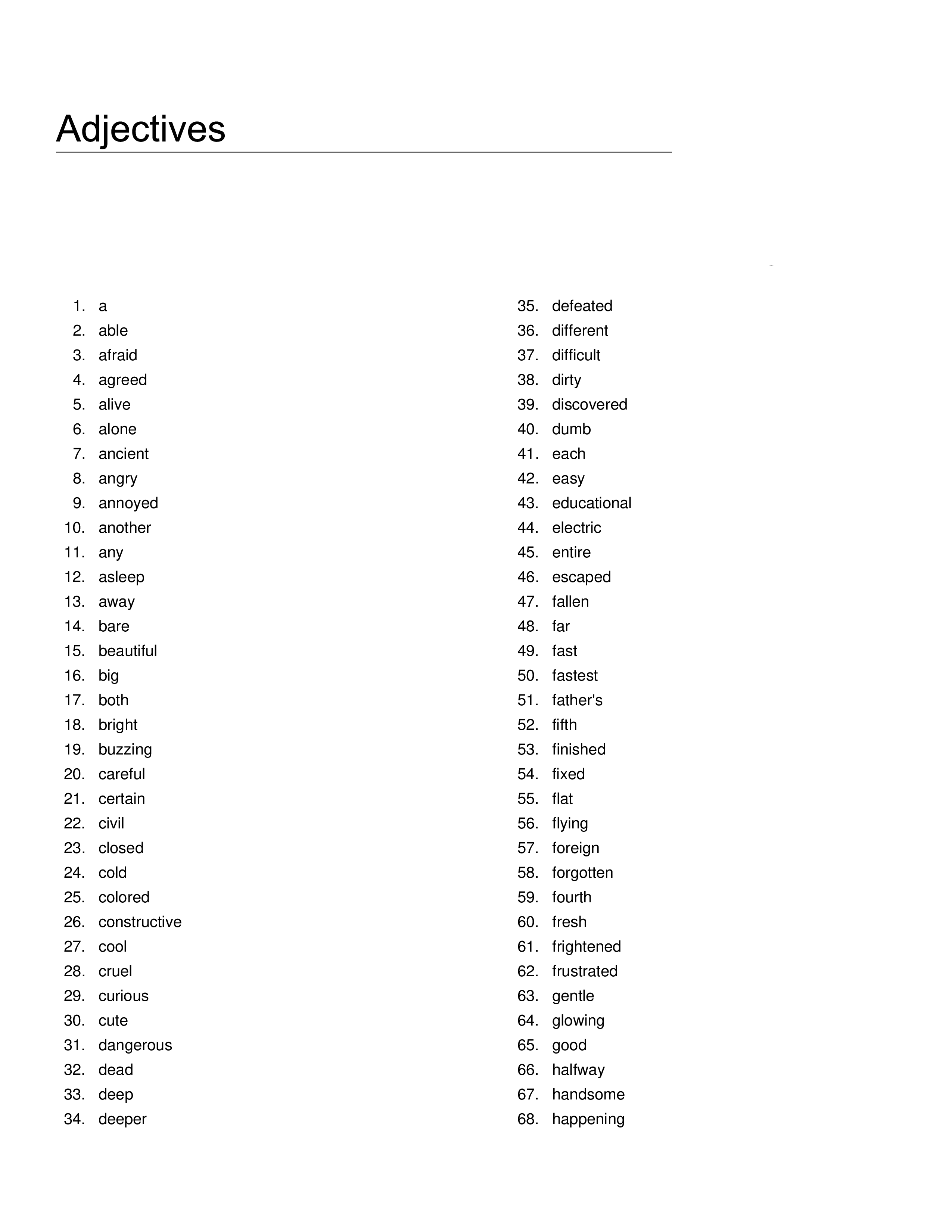List of Adjectives
Save, fill-In The Blanks, Print, Done!

Download List of Adjectives
Adobe Acrobat (.pdf)- This Document Has Been Certified by a Professional
- 100% customizable
- This is a digital download (69.58 kB)
- Language: English
- We recommend downloading this file onto your computer.
How to use Adjectives in English Language? Download this Adjectives List template now!
Creating a comprehensive list of adjectives in the English language is a monumental task, as there are thousands of adjectives to choose from. Adjectives are words that describe or modify nouns and pronouns, and they come in various categories such as descriptive adjectives, demonstrative adjectives, possessive adjectives, and more.
Remember that learning adjectives is an ongoing process. The more you read, write, and engage with the English language, the more adept you will become at using adjectives effectively. Additionally, studying them in context is often more beneficial than simply memorizing lists.
What are adjectives list?
To study adjectives effectively, you can follow these steps:
- Start with Common Adjectives: Begin by studying common adjectives that are used frequently in everyday language. These include adjectives like "happy," "sad," "beautiful," "angry," "small," "big," "red," "green," and so on.
- Use Online Resources: There are numerous online resources, websites, and apps that provide lists of adjectives categorized by different attributes, such as size, shape, color, personality, etc. These resources can be helpful for expanding your vocabulary.
- Read Widely: Reading books, newspapers, magazines, and online articles exposes you to a wide range of adjectives used in context. Pay attention to how adjectives are used to describe people, places, objects, and emotions.
- Thematic Lists: Create thematic lists of adjectives. For example, you can make lists of adjectives related to emotions (e.g., happy, sad, excited), physical appearance (e.g., tall, short, slim), weather (e.g., sunny, rainy, windy), and so on. This helps you remember adjectives in context.
- Flashcards: Create flashcards with adjectives on one side and their definitions or sample sentences on the other side. Review these flashcards regularly to reinforce your knowledge.
- Use Adjective Worksheets: You can find adjective worksheets and exercises online or in grammar books. These worksheets often include fill-in-the-blank sentences where you need to choose the correct adjective.
- Practice Writing: Write short paragraphs or essays that incorporate a variety of adjectives. This hands-on practice can help reinforce your understanding of how adjectives function in sentences.
- Language Learning Apps: Many language learning apps, such as Duolingo and Memrise, include adjective lessons and exercises that make learning adjectives engaging and interactive.
- Play Word Games: Play word games like Scrabble, Boggle, or crossword puzzles, which often involve using adjectives to form words and complete sentences.
- Seek Feedback: Share your writing or sentences with a teacher, tutor, or language partner who can provide feedback on your use of adjectives.
We support you and you with this Adjectives List template, which will save your time and effort and help you to reach the next level of success in your work, education, and business! This blank Adjectives List has ways to grab your readers attention. This list of adjectives template is intuitive, ready-to-use and structured in a smart way. Try it now and let this template inspire you. We certainly hope that this Adjectives List will fit your needs.
Download this Adjectives List template now!
DISCLAIMER
Nothing on this site shall be considered legal advice and no attorney-client relationship is established.
Leave a Reply. If you have any questions or remarks, feel free to post them below.
Related templates
Latest templates
Latest topics
- Excel Templates
Where do I find templates for Excel? How do I create a template in Excel? Check these editable and printable Excel Templates and download them directly! - GDPR Compliance Templates
What do you need to become GDPR compliant? Are you looking for useful GDPR document templates to make you compliant? All these compliance documents will be available to download instantly... - Google Docs Templates
How to create documents in Google Docs? We provide Google Docs compatible template and these are the reasons why it's useful to work with Google Docs... - IT Security Standards Kit
What are IT Security Standards? Check out our collection of this newly updated IT Security Kit Standard templates, including policies, controls, processes, checklists, procedures and other documents. - Letter Format
How to format a letter? Here is a brief overview of common letter formats and templates in USA and UK and get inspirited immediately!
cheese

